Having had issues with a slightly more complicated section of code, I've stripped away at it, but still the error remains. Could you cast a cursory eye over this and point out my errors?
//before this, nbnoeud is defined and graphe is a stream that reads from a .txt file
double* xtab = (double *) calloc(nbnoeud, sizeof(double));
double* ytab = (double *) calloc(nbnoeud, sizeof(double));
char** nomtab = (char **) calloc(nbnoeud, 100*sizeof(char));
double x, y; char nom[100]; int numero=0, scancheck;
int a;
for(a=0; a<nbnoeud; a++){
scancheck = fscanf(graphe, "%d %lf %lf %[^\n]", &numero, &x, &y, nom);
if(scancheck = 4) printf("Read item %d; \t Scancheck: %d; \t %s - (%lf, %lf). \n", numero, scancheck, nom, x, y);
xtab[a] = x;
ytab[a] = y;
nomtab[a] = nom; I imagine it's something to do with compatibility of this but to my eyes it all checks out
/*int b; //this section just illustrates that only the previously accessed elements are being overwritten. See code2.png
for(b=0; b<=nbnoeud; b++){
printf("%s \n", nomtab[b]);
}*/
}
for(a=0; a<nbnoeud; a++){
printf("Read item %d; \t \t \t %s - (%lf, %lf). \n", a, nomtab[a], xtab[a], ytab[a]);
}
exit(1);
The issue arises when I come to print nomtab[0] through [7] (nbnoeud = 8, in this case), as all values (nomtab[0], nomtab[1], etc.) are equal to the final value that was written. Bizarrely, having checked it, only the already accessed elements of nomtab are overwritten. For example, after the first loop, nomtab[0]= Aaa and the rest equal null; after the second loop, nomtab[0] & nomtab[1] = Baa and the rest equal null (see second image). I imagine there is moronically simple resolution for this but that makes the not-knowing all the more intolerable.
I've also tried using strcpy and it didn't like that.
Any ideas?
Output:

Output with check of array contents after each loop
